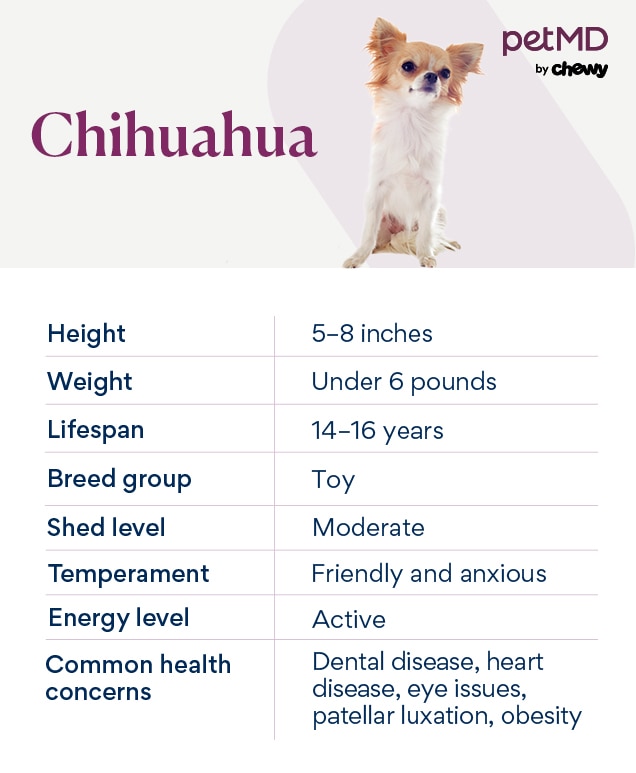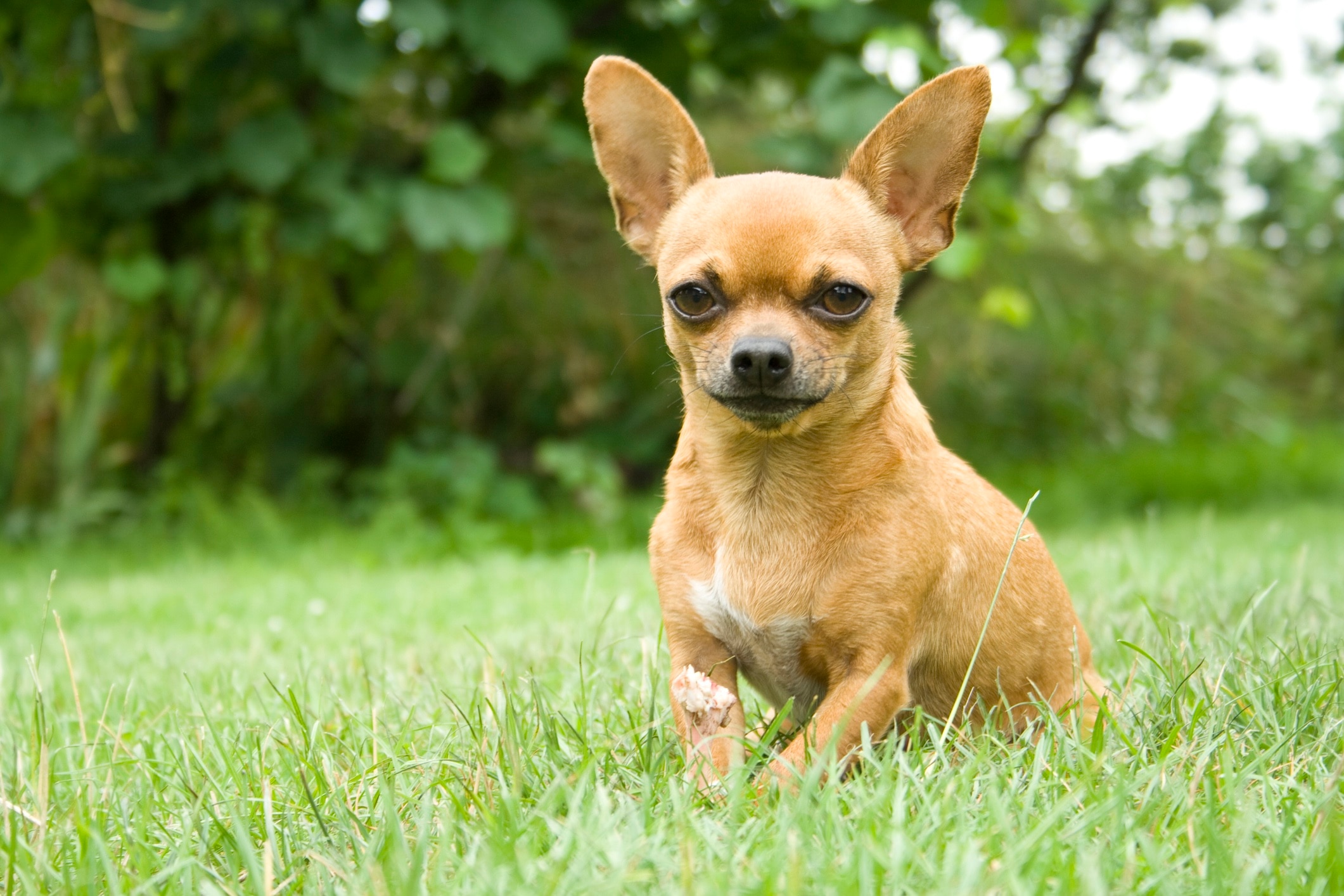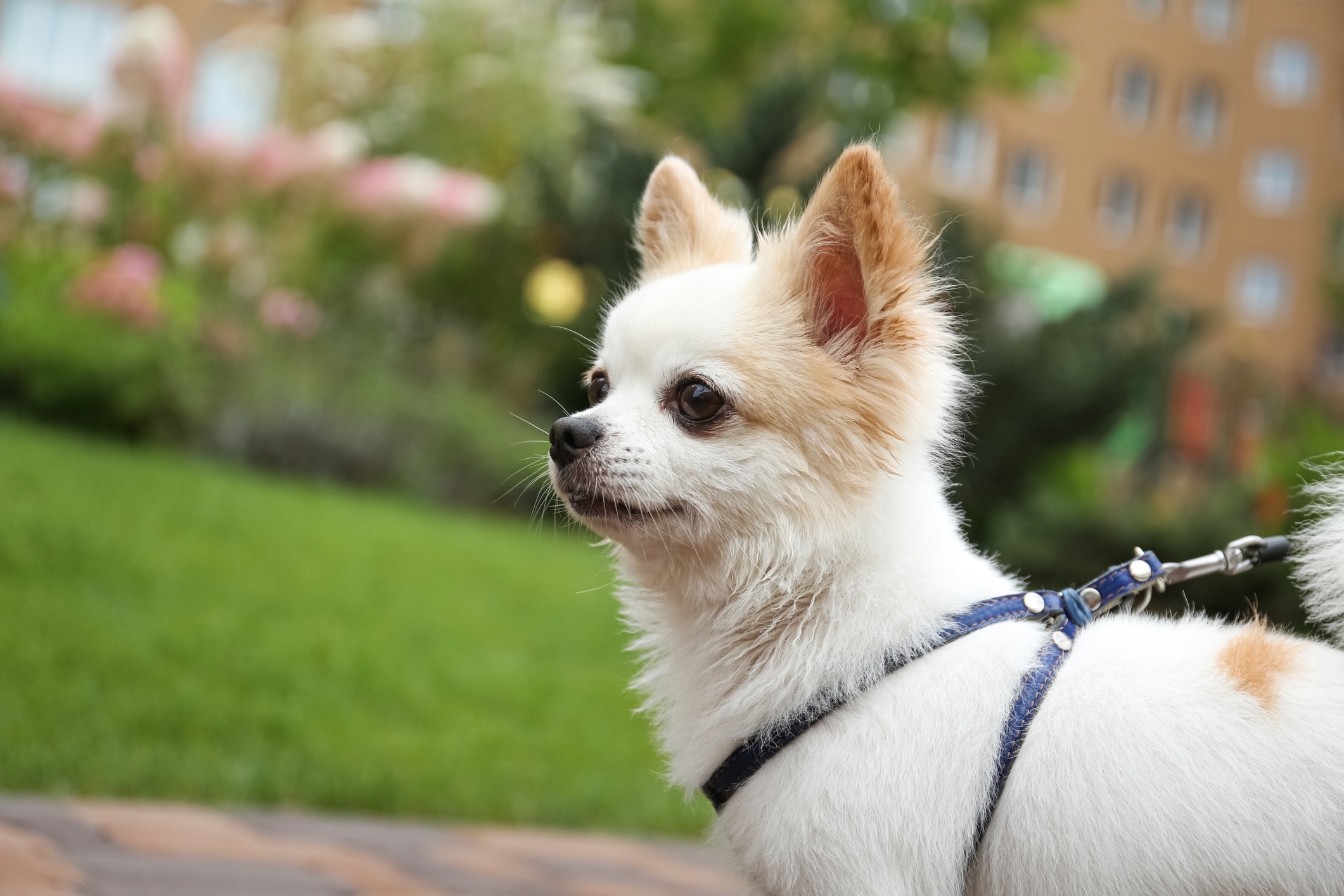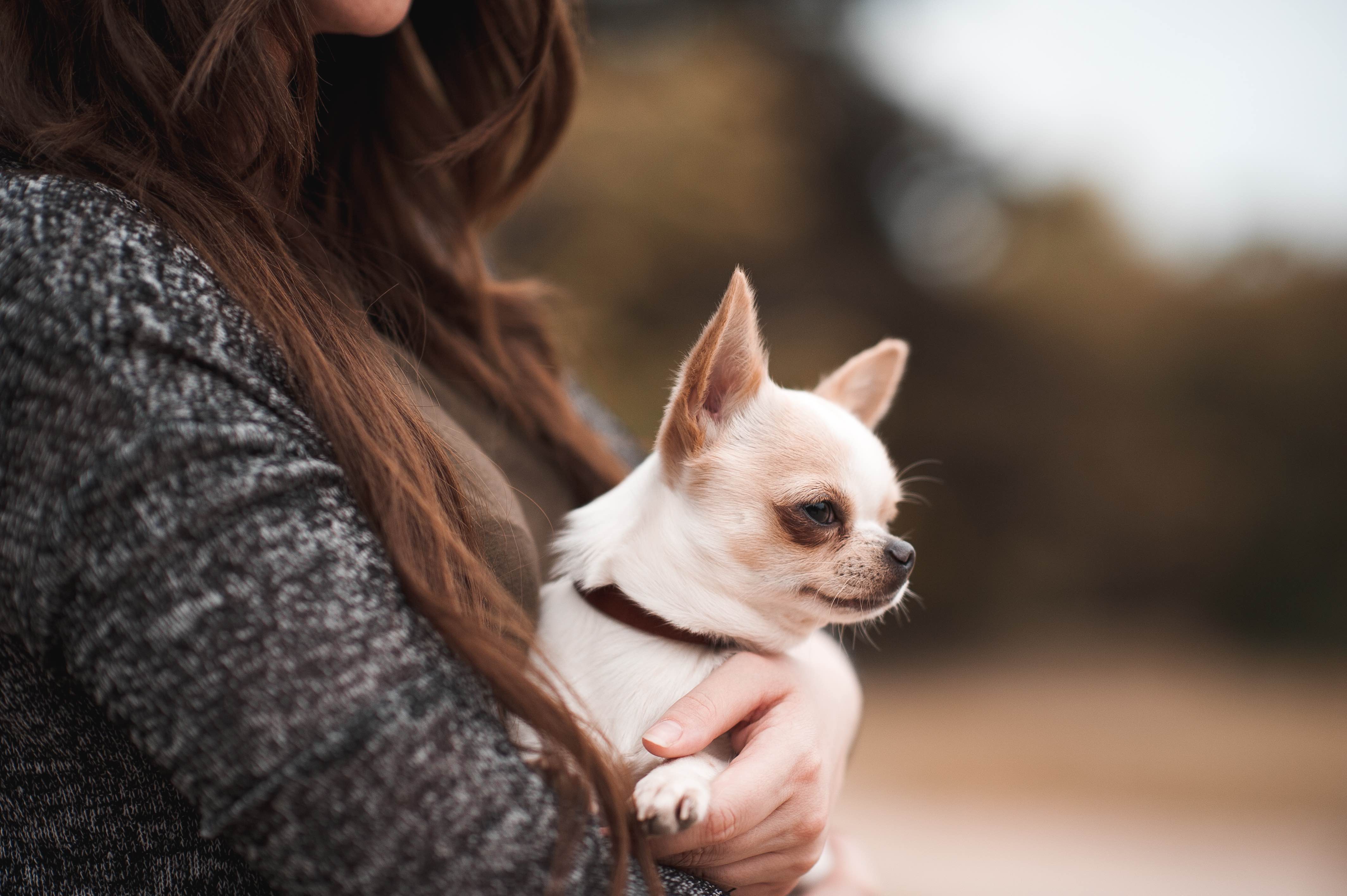Chihuahua
iStock/Phanuwat Yoksiri
Looking for a small dog breed with a big personality? Chihuahuas are just that. Affectionally called “Chis” by their fans, Chihuahua dogs are loving with those they trust and tend to bond closely with their families. They are excellent companions and even better lap dogs.
Documents suggest that conquistadors in the 16th century found many small dogs in the Mexican state now known as Chihuahua. They became more well known as house pets around the early 20th century, and The American Kennel Club (AKC) officially recognized the Chihuahua dog breed in 1904.
These little dogs top out around 6 pounds and only stand about 5–8 inches tall. There are long-haired Chihuahuas and those with short coats, and they have two different skull shapes: “apple head” and “deer head.”
Caring for a Chihuahua

Chihuahuas make great family pets because they are loyal, loving, and always want to be by their human’s side. Their small size makes them easy to take with you on trips and errands, though they can be feisty and bark at other people and dogs.
Though small in stature, Chihuahuas are high-energy dogs and require lots of playtime and activity. Daily exercise with walks and indoor playtime helps maintain their physical and mental health. When they feel nervous, they will bark—and sometimes forget how truly tiny they are. It’s vital for Chihuahua parents to monitor their dog closely whenever they’re around other animals and unfamiliar people.
Chihuahuas are average shedders. While grooming specifics depend on whether you have a short-haired or long-haired Chihuahua, their coat care is relatively low-maintenance. The biggest part of your care routine will be their teeth, which need to be brushed daily to prevent dental disease.
Chihuahua Health Issues

The average Chihuahua lifespan is 14–16 years; they’re actually one of the longest-living dog breeds.
Along with of their long lifespan, Chihuahuas are generally healthy. But, like all dogs, they are predisposed to certain medical conditions.
Obesity
Weight gain can sometimes be difficult to notice, especially in long-haired Chihuahuas. The gain is usually due to poor diet and lack of exercise. Obesity in dogs can lead to diabetes, joint issues, and heart and respiratory disease.
Luxating Patellas
Patellar luxation is a condition where the kneecap slips out of its normal position, causing discomfort, limping, and arthritis if it becomes a chronic issue. These dogs will be seen occasionally skipping and holding up a back leg while walking.
Often, the patella returns back to the correct position on its own or with a gentle massage of the area. Surgery is recommended in severe cases.
An appropriate diet to avoid weight gain, regular exercise, joint supplements, and physical therapy can be helpful to prevent this condition from worsening.
Periodontal Disease
Periodontal disease, or dental disease, is commonly seen in Chihuahuas because it’s easy for teeth to overcrowd their small mouths. This overcrowding leads to tartar build-up and plaque development. On top of that, many Chihuahuas retain their baby teeth, crowding the mouth even further.
Routine teeth brushing, dental cleanings, and surgical removal of any lingering baby teeth will help keep your Chi’s mouth healthy.
Collapsing Trachea
Collapsing trachea is a condition where the main airway (the trachea) that allows air to enter and exit the lungs begins to collapse on itself. It’s secondary to weakness in the cartilage that normally holds this tube open, and it’s believed that genetics are the main cause.
Coughing (often described as “goose-honking”), wheezing, and respiratory distress are the main clinical signs. It is a chronic and progressive process, which means the signs will worsen with age. Mild cases often require no treatment, while moderate to severe cases require weight management, lessening allergens in the environment, and cough suppressants. If all other remedies fail, surgery might be recommended.
To protect their trachea, pet parents should walk their Chihuahua on a harness instead of clipping a leash to their collar.
Heart Disease
Congestive heart failure is the leading cause of death in older Chihuahuas and most often related to chronic degenerative mitral valve disease. This specific condition weakens the valve on the left side of the heart, causing blood to leak backward. This eventually leads to heart enlargement, increased stress on the heart, and congestive heart failure.
Chihuahuas are also prone to congenital heart issues such as patent ductus arteriosus (PDA), where a blood-carrying vessel doesn’t close after birth, leading to an overload of blood being carried to the lungs. Clinical signs of heart disease include:
-
Coughing
-
Exercise intolerance
-
Weakness
-
Collapse
Often, your veterinarian will hear a heart murmur during an examination, which can be the first indicator of underlying heart disease. PDAs require surgery for appropriate therapy. Chronic degenerative valve disease is, unfortunately, a progressive process that can require lifelong heart medications and frequent monitoring by a cardiologist.
Hydrocephalus
Hydrocephalus is a congenital abnormality where fluid accumulates within the brain. Clinical signs include seizures, confusion, bulging eyes, weakness, and ataxia (a “drunken” gait). Mild cases are often medically managed, while severe cases may require surgery.
Eye Problems
Part of the Chihuahua’s appeal is their extra-large, expressive eyes. But they can inherit a handful of eye conditions, including glaucoma, chronic dry eye, and cataracts. Clinical signs of these conditions include:
-
Bulging eyes
-
Rubbing at the eyes due to pain
-
Blindness
Eye conditions can be quite painful, so it’s important to see a veterinarian if you have any concerns about your Chihuahua’s eyes.
Legg-Calve-Perthes Disease
Legg-Calve-Perthes disease is a degenerative hip condition found in Chihuahua puppies, typically between the ages of 6–9 months. It’s thought to be caused by decreased bloody supply to the hip and is characterized by the ball of the hip bone starting to die off, leading to pain and fracture.
The condition can be remedied with surgery to remove the ball of the femur bone, which will decrease pain and improve your pet’s quality of life.
Reproductive Issues
Chihuahuas have a large, domed skull and a small body—including a small pelvis. Therefore, it can be difficult for females to pass the large heads of Chihuahua puppies through their birthing canals. C-sections are sometimes necessary and are often performed with planned pregnancies for this breed.
Hypoglycemia
Hypoglycemia, or low blood sugar, is a condition seen often in this breed due to the dogs’ small size. Most often seen in young Chihuahuas, it’s often managed with appropriate diet and frequent feedings. Clinical signs include severe lethargy, decreased appetite, weakness, collapse, or seizures. Severe cases require hospitalization on intravenous fluid therapy with sugar supplementation.
What To Feed a Chihuahua
Chihuahuas are prone to obesity, so it’s important to feed them a well-balanced diet and to exercise them daily. Adult Chihuahuas should be fed a restricted-calorie diet if weight gain is noticed. Otherwise, a twice-daily, balanced adult small bite diet is recommended.
Feeding your Chihuahua dry kibble is recommended to lessen the risk of periodontal disease. That’s because dry kibble is abrasive on the teeth and can remove some plaque buildup. Make sure to monitor your Chi’s treats and snacks as well—even a few calories can add up in a toy breed.
How To Feed a Chihuahua
Chihuahua puppies should be fed frequent meals—about three or four daily—to avoid hypoglycemia, depending on veterinary recommendations. High fat, protein, and complex carbohydrate-heavy meals will lessen the risk of low blood sugar issues, too.
Feeding your Chi from a raised dog bowl can help older dogs with a collapsing trachea. If your pup lowers her head to eat, this can lead to closing of the airway and can induce coughing.
How Much Should You Feed a Chihuahua?
Your veterinarian can help you calculate the daily calories your pet should eat to avoid weight gain. When choosing a diet for your Chihuahua, choose a small-breed food to allow easy chewing. These formulated diets will also have recommendations for serving sizes.
Because every dog is different, it’s important to monitor for weight gain, weight loss, and muscle loss to determine if more or less food should be offered.
Nutritional Tips for Chihuahuas
Supplements that may support the health of this breed include omega fatty acids, which are good for your dog’s heart, brain, skin, and joints. Dental chews and supplements may also be recommended by your veterinary team to lessen the risk of periodontal disease.
Behavior and Training Tips for Chihuahuas
Chihuahua Personality and Temperament

Chihuahuas can be a dedicated lap dog, a sassy ball of energy, or both. In fact, the official breed standard describes Chis as having a “saucy expression.”
Chihuahuas are loyal, playful, energetic dogs who often think they are larger than they actually are. They range from being bold and curious to being quite shy and timid, but they are typically bright and loving with their family. They can have some social anxiety around new people and animals and are known to bark at others when introduced.
They are great around children and other pets if introduced properly in a controlled environment. But due to their small size, it’s important that children are monitored closely when playing with these dogs to avoid accidental injury.
Chihuahua Behavior
The Chihuahua’s small size makes them easy to take everywhere, which can be a blessing and a curse. Because these dogs are often carried around and go lots of places, they can easily develop separation anxiety.
Having a safe space for your Chihuahua at home, such as a small dog crate, and giving them plenty of toys can be helpful to avoid this stress.
Though small in stature, Chihuahuas are high-energy dogs and require lots of playtime and activity. Daily exercise with walks and indoor playtime helps maintain their physical and mental health.
Though small in stature, Chihuahuas are high-energy dogs and require lots of playtime and activity. Daily exercise with walks and indoor playtime helps maintain their physical and mental health.
Chihuahua Training
Chihuahuas are often easy to train because they are smart and want to please their pet parents. That said, they can also be strong-willed due to their high intelligence, and they need a patient trainer who uses positive reinforcement.
This strong-willed nature can also make house training more difficult with a Chihuahua than with other breeds. Food rewards are recommended (and are enthusiastically welcomed!) when learning and training—but stay mindful of calories!
When bringing home a Chihuahua puppy, immediately begin socializing them by exposing them to new people, animals, and situations. This will help your little dog grow to be calm and confident throughout their long life.
Fun Activities for Chihuahuas
-
Walks
-
Being carried around on errands
-
Indoor playtime
Chihuahua Grooming Guide
Grooming isn’t much of a hassle with Chihuahuas. But note that it’s easy for Chihuahuas to get cold—again, they are so small. But because of this, they’re often happy to be put in doggy sweaters, wrapped up in warm blankets, and dressed in coats to stabilize their body temperature.
Coat Care
Chihuahua dogs can have a short or long coat in a wide range of colors including black, white, and brown.
Short-haired Chihuahuas should be brushed about once a week to help control their moderate shedding. Long-haired Chihuahuas require more frequent brushing—about two or three times weekly—along with routine de-shedding of the undercoat. They might need a bath once or twice a month, depending on how active they are outdoors.
Eye Care
The Chihuahua’s big eyeballs can get teary, so pet parents might need to wipe them once or twice each week to remove any excess tearing or discharge. Long-haired Chihuahuas may require professional grooming to remove hair around their eyes, which can cause irritation.
Ear Care
A Chihuahua’s ears are pricked, meaning they stand at attention. This lets oxygen enter them easily, making Chihuahuas less prone to moisture and ear infections than dogs with floppy ears. Because of this, you probably won’t need to clean their ears very often, if at all.
Dental Care
The biggest part of their upkeep will be their teeth, which need to be brushed daily to prevent dental disease.
Considerations for Pet Parents

Think about your home environment before adopting a Chihuahua. Young children, larger dogs, and a busy schedule (less time for your Chi) are things that need to be considered when introducing this breed to a household. Larger playmates might accidentally hurt these little guys. But overall, Chihuahuas are a wonderful breed for families who are looking for a playful, affectionate companion.
Chihuahua FAQs
How long do Chihuahuas live?
The average Chihuahua lifespan is 14–16 years.
How much does a Chihuahua cost?
The average cost for Chihuahua puppies ranges from $800–$2,000, depending on the breeder. You can also find Chihuahuas at rescues and shelters.
How much does a Chihuahua weigh?
Chihuahuas typically weigh 6 pounds or less.
Why do Chihuahuas shake?
There are many possible reasons why a Chihuahua may shake, ranging from benign to serious. Like all dogs, Chihuahuas can shake because they are cold. But Chihuahuas can be prone to hydrocephalus (neurologic condition) and low blood sugar (hypoglycemia), which can both lead to shaking and even seizures.
Should you buy a teacup Chihuahua?
Do not work with a breeder who claims to sell teacup Chihuahuas. Teacup dogs have been bred to prioritize size over health and often develop health problems. Full-grown Chihuahuas are already very tiny.
